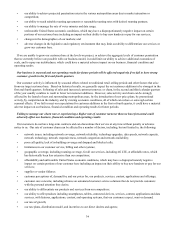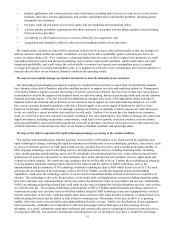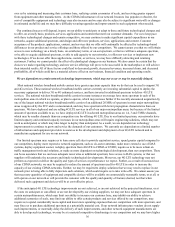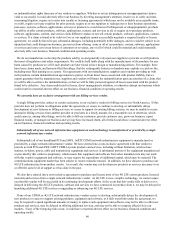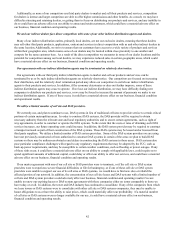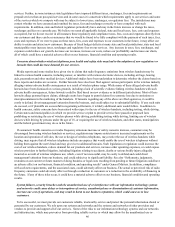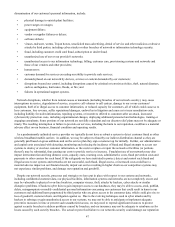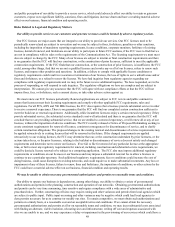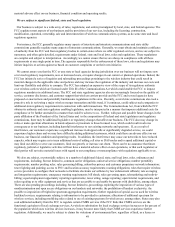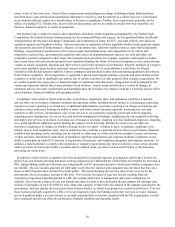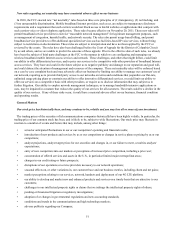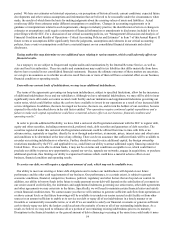Metro PCS 2011 Annual Report Download - page 55
Download and view the complete annual report
Please find page 55 of the 2011 Metro PCS annual report below. You can navigate through the pages in the report by either clicking on the pages listed below, or by using the keyword search tool below to find specific information within the annual report.44
cause prospective customers to not subscribe to our service or current customers to terminate their service from us. If we are
assessed additional charges on a retroactive basis, the use of our services results in significant intercarrier costs, we are unable
or unwilling to offer services to certain foreign destinations, or prospective customers do not subscribe to our service or current
customers terminate service with us, it could limit our ability to grow our customer base which could have a material adverse
effect on our business, financial condition and operating results.
Some carriers who terminate calls originated by our customers have sought, and others may seek, to impose termination
charges on us that we consider to be unreasonably high and have threatened to pursue, or have initiated or may initiate, claims
against us to recover these charges. We have been drawn into multiple state commission proceedings in which local exchange
carriers are seeking approval of past wireless termination rates that we consider to be excessive. The outcome of these claims is
uncertain. A determination that we are liable for additional or excessive terminating compensation payments could subject us to
additional claims by other carriers and while we have reserved funds we believe are appropriate for such claims, litigation is
uncertain and the amount determined by a court or regulatory agency could be different than our reserves. Further, legal and
business considerations inhibit our ability or willingness to block traffic to telecommunication carriers who demand
unreasonable payments. The FCC, in its recent Order on Reconsideration reforming intercarrier compensation, has held that
the exchange of intraMTA traffic between local exchange carriers and CMRS providers, when the parties have an
interconnection agreement, will be exchanged at a default rate of bill-and-keep as of July 1, 2012. The FCC also held that the
exchange of intraMTA traffic between local exchange carriers and CMRS providers, when the parties do not have an
interconnection agreement, will be exchanged at a default rate of bill-and-keep as of December 29, 2011. While the impact of
these changes in the intercarrier compensation arrangements between LECs and CMRS carriers generally is considered to be
favorable to us, it is difficult to quantify the benefit of this. We also may be subject to protracted litigation proceedings
pertaining to the new comprehensive intercarrier compensation regime that may subject us to substantial costs and result in
uncertainty. In addition, certain transit carriers have taken the position that they can charge “market” rates for transit services,
which rates may in some instances be significantly higher than our current rates or the rates we are willing to pay. We may be
obligated to pay these higher rates and/or purchase services from others, engage in direct connection, or pay terminating
compensation charges in the absence of negotiated agreements, which may result in higher costs, which could have a material
adverse effect on our business, financial condition, and operating results.
A portion of our third-party customer service and technical support providers and a portion of our revenue are derived
from geographic areas susceptible to natural and other disasters.
Our focus on major metropolitan areas and our use of third party suppliers and service providers, some of which are located
in developing nations, such as Mexico, Panama, Antigua and the Philippines, may make our products and services more
susceptible to certain events, including political upheavals, war, terrorist attacks, strikes, natural disasters, and pandemics. The
outsourcing of certain customer and technical support lowers our operating costs and adds flexibility, but also adds risk as we
rely on these third-party service providers working directly on our behalf with our customers. Customers may react negatively
to or have certain perceptions about our use of or their receiving direct customer and technical support from outside the U.S.,
especially with the current legislative scrutiny and focus on jobs being sent overseas and the security of personal information
being sent overseas. In addition, a number of our markets and certain of our centralized network equipment are located in areas
which have a history of natural disasters that may adversely affect our operations in those areas such as earthquakes,
hurricanes, tornadoes, blizzards, snowstorms, ice storms, or flooding. In certain instances we do not have redundant facilities.
These national disasters could affect our ability to provide our services and cause us to have to stop or limit selling and
servicing our customers and products. These events also may cause our networks to cease operating for a substantial period of
time while we reconstruct or repair them and our competitors may be less affected than we are. Some network outages give
rise to regulatory reporting obligations, which subject us to additional burdens and risks, and if we fail to meet such obligations,
it could result in fines, forfeitures, consent decrees, corporate monitors or other adverse actions. We cannot provide any
assurance that the business interruption insurance and property insurance we have will cover all losses we may experience as a
result of such events, that the insurance carrier will be solvent, that rates will remain commercially reasonable, that the
insurance carrier will not drop us, or that the insurance carrier will pay all claims made by us. If we experience any of these
events, we may have reduced revenue, lower growth, increased churn, increased expenses, and reduced profitability, and may
have difficulty finding new suppliers and vendors, which could have a material adverse effect on our business, financial
condition and operating results.
Our success depends on our ability to attract and retain qualified management and other personnel.
Our business is managed by a small number of key executive officers, including our chief executive officer, Roger Linquist.
None of our managing key executives has an employment contract, so any such executive officers may leave at any time
subject to forfeiture of any unpaid performance awards and any unvested options or restricted stock. In addition, at this time,
the exercise price of a substantial portion of the unvested options of our key executive officers is above, and in some cases


